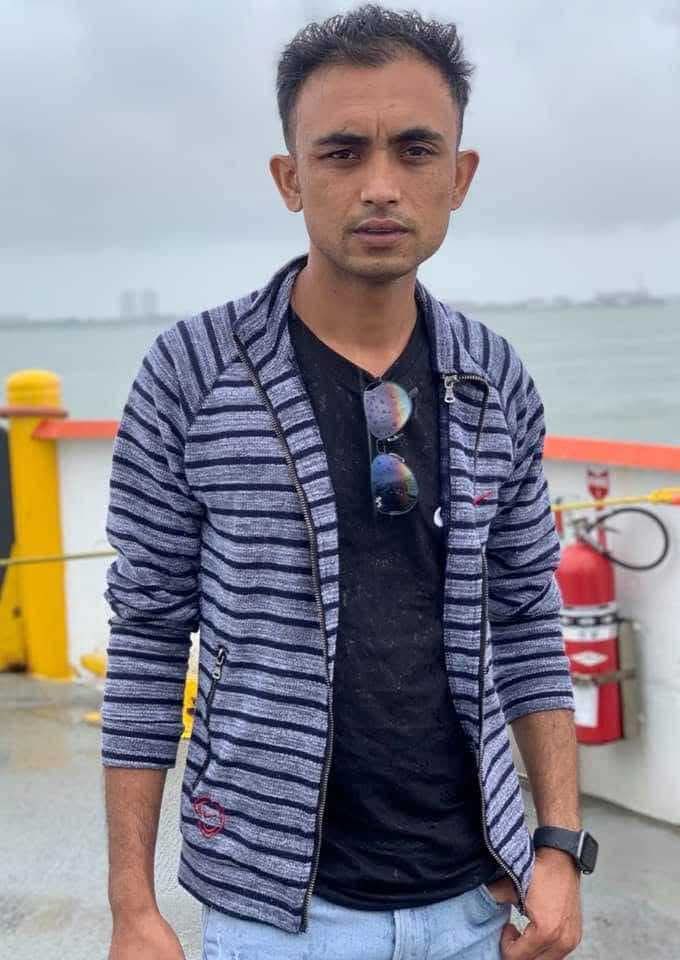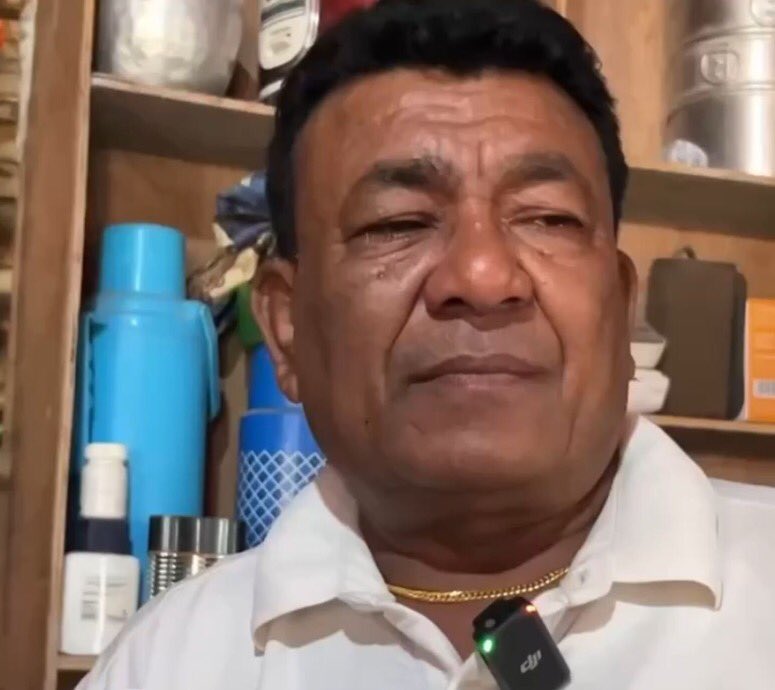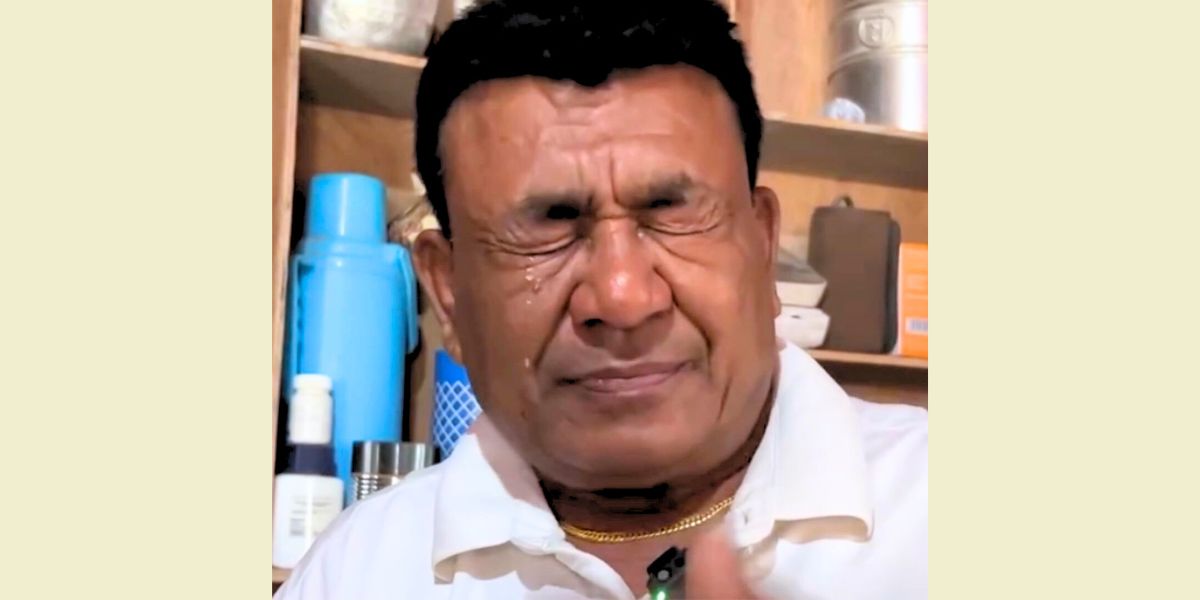In some incidents, there are many questions, but not a single answer.
The incident where U.S. President Donald Trump deported 12 Bhutanese refugees under his strict immigration policy is one such case.
Bhutan refused to accept the refugees deported from the U.S. The Bhutanese government arranged meals for them in a hotel, gave them 30,000 Indian rupees each for expenses, packed them into hired vehicles with Indian license plates and sent them toward Nepal.
Among them, four individuals—three who reached the Beldangi refugee camp in Jhapa and one arrested at the Kakarbhitta border—have been in police custody for the past 10 days. The whereabouts of the remaining eight are unknown.
This incident has given sleepless nights to one person at the Beldangi camp – 55-year-old Narayan Kumar Subedi.
He had been living a solitary life selling dried and smoked fish in nearby settlements around the Beldangi camp. His daily routine was completely disrupted after the day those four were arrested. He hasn’t been able to go about his trade. Forget trade—he can’t even eat or sleep.
These days, he spends sleepless nights in Hut No. 1 of the Beldangi camp. Still groggy due to lack of sleep, he travels to Damak every morning and then covers a 53-kilometer journey to reach the eastern border at Kakarbhitta.
The Kakarbhitta Area Police Office has become a new destination Subedi had never wished for in his life. It is here that those four—Ashish Subedi, Roshan Tamang, Santosh Darji, and Ashok Gurung—have been kept in custody.
Not only does he visit them every day, but the responsibility of arranging their food, bedding, and other necessities has also fallen on Subedi’s shoulders.
The reason? Among those arrested, 36-year-old Ashish Subedi is his son. He doesn’t know the other three. But since they have no close relatives here and no one to take responsibility for them, Subedi has taken it upon himself to care for all of them, as they were arrested along with his son and are Bhutanese refugees like him.
When we spoke to him on Sunday afternoon, he had just come out of the Kakarbhitta Police Station after meeting his son and the other three.
"It’s been 10 years since I’ve lived alone in the Beldangi camp," Subedi said in our conversation. "I am bewildered after the responsibility of four people suddenly fell on me. When I talk to the police and immigration officials, it’s still not certain how long they’ll have to remain in custody. Until it’s resolved, I’m the one who has to look after them. My son is my son, of course, but the other three are also from my own village. How can I not care for them just because we’re not related?"
This incident has given rise to countless questions in Subedi’s mind.
He has questions for the U.S. government that deported his son, for the Bhutan government that chased them away to Nepal from Bhutan. He has questions for the Nepal government that arrested and detained them after they arrived here. And he also has questions for the United Nations, which verified them as refugees and sent them for resettlement in the U.S.
In this story, we’ll discuss all the questions raised by Subedi. But first, let’s hear his story.
He was born in Lalai village, Gelephu sub-district, in southern Bhutan. When the Bhutanese government expelled over 100,000 Nepali-speaking people, Subedi was forced to leave his birthplace too.
"I worked as a mechanic in Bhutan’s government service. We had five acres of land, a betel nut plantation, and plenty of cattle," he said. "After our government job, ancestral land, and livestock were unjustly taken away, my wife and I fled to Nepal with our young children in tow."
He arrived in Nepal in 1991 after being expelled from Bhutan. At that time, his son Ashish was two years old, and his daughter Nilam was just a few months old.
Upon arriving in Nepal, he first settled in the Khudunabari camp. Here, his first marriage ended in divorce. He then married Kamala Gurung, with whom he had a third child.
When the United Nations began resettling Bhutanese refugees in third countries, his wife and children went to the U.S. one by one 10 years ago. He, however, couldn’t go. The UN deemed him "ineligible" citing discrepancies in his documents.
"I don’t know if the documents had discrepancies or if I made any mistake during the interview, but they told me that I can’t go," Subedi recalled. "Even though I couldn’t go, I thought my wife and kids could build a future there, so I pushed for them to leave."
Since his family left for the U.S., Subedi has been alone in the camp. His family members sent money occasionally, but to sustain his daily life, he took up small-scale trading here.
Now, with the sudden responsibility of his son and three others on his shoulders, he’s worried about how to manage the expenses.
That was Subedi’s story. Now, let’s hear the questions swirling in his mind.
 Ashish Subedi
Ashish Subedi
First question to the U.S.
The Trump administration deported Bhutanese refugees, citing their alleged involvement in various criminal activities. Subedi doesn’t know what crimes the other three committed. But he says his son Ashish ended up in prison due to a domestic dispute with his wife.
"Ashish had married a girl from our village after he went to the U.S. They also have a two-and-a-half-year-old daughter," Subedi said. "He was apparently arrested because of a family dispute."
"When someone is released after such an arrest, someone apparently has to take responsibility," he continued. "His wife can’t take responsibility. Her sister and mother were there too, but no one stepped up. So, he was deported."
Ashish was deported from Pennsylvania, U.S. Other refugees were also arrested from various locations. All were flown from New York to Delhi, India, and taken to Bhutan’s Paro International Airport on the morning of March 28. U.S. officials also accompanied them.
After handing them over to the Bhutanese government, the U.S. officials left. The U.S. didn’t care how the Bhutan government treated them afterward or whether it accepted their responsibility.
Here’s Subedi’s question to the Trump administration:
"The 12 Bhutanese refugees deported this time including my son didn’t enter the U.S. illegally. The U.S. government accepted them along with tens of thousands of other Bhutanese refugees and granted them the right to live in America legally," he said. "Refugees are people who have been stripped of their rights as citizens and expelled by their country. They’re unfortunate souls not accepted by their own country. The U.S. had shown generosity by offering shelter to such stateless refugees on its soil. It’s sad that the same U.S. is now expelling them."
He added, "The U.S. is also deporting citizens of other countries in similar fashion. Some Indians and Nepalis have also been deported. I’ve heard that hundreds of African immigrants have also been deported. But the situation of Bhutanese refugees is different from those Indian, Nepali, or African citizens. Those people have a country and a home to return to. We refugees don’t have our own country or home. The U.S. isn’t unaware of this. It knows very well that the Bhutanese government unjustly expelled Nepali-speaking Bhutanese, forcing them into becoming refugees. Yet, how did it deport Bhutanese refugees? On what basis?"
"Does the U.S. have the right to deport refugees—who have no country or home—like citizens of other countries?" Subedi asked. "Even if they committed crimes, maybe they should’ve been punished in prisons there. Can you send them back to the very country that expelled them? Isn’t this like knowingly pushing refugees into the jaws of death?"
Second question to Bhutan
The Bhutanese government received the refugees handed over by the U.S. at Paro International Airport on March 28, but it didn’t accept them.
It showed its intent to not let them stay on Bhutanese soil even for a day.
First, their statements were recorded. They were provided meal in a good hotel. Then they were told, "You have no one to call your own in Bhutan. You have no land, no house. You won’t find any work to earn a living either. Moreover, Nepali isn’t spoken here like before. You don’t even know the local language. So, you can’t survive here."
They were also told, "If you stay here, you’ll have to serve punishment under Bhutanese law for the crimes you were arrested for in the U.S. Instead, go to Nepal. You still have people there you can call your own. You can work and earn a living there."
Hearing this, the refugees were terrified.
They clearly understood the warning that staying in Bhutan meant spending their lives in prison. So, they chose the option of going to Nepal.
Bhutanese officials gave each of the deported refugees 30,000 Indian rupees for travel expenses and also arranged vehicles for them.
They were taken to the Indian border town of Panitanki via Phuntsholing and Jaigaon in three vehicles with Indian license plates and dropped off there.
"They were apparently confused about how to enter Nepal from there," Subedi said, based on his conversation with his arrested son. "Some stayed hiding in India. Others paid a broker 22,000 rupees to cross into Nepal from under the Mechi bridge."
Among those who paid the broker to enter Nepal, Ashish and two of his friends reached the Beldangi camp on the night of March 28.
"I was preparing to go to the U.S. as my children had been calling me. I hoped my paperwork would work out someday. Now that my son himself has been expelled from the U.S., all those dreams are shattered," Subedi said. "My life has been full of hardship, and now I worry my son’s future will be dark too."
Here Subedi has a question to the Bhutanese government:
"The U.S. deporting my son and other refugees directly to Bhutan has established internationally that they are Bhutanese citizens. The Bhutan government should’ve rejected those returned in such a manner at the airport itself. It shoudn’t even have let them disembark. It should have sent them back on the same plane they arrived on. But they didn’t do so. They pretended to accept the refugees in front of the world, fed them in a nice hotel, and then, deceiving the international community, chased them back to Nepal," Subedi said.
He added, "The Bhutan government should’ve made arrangements for a safe stay for the refugees deported by the U.S., or else on what basis did it send them to Nepal? Is Nepal their country? Ashish has me, his father, here; the other refugees have no one. Their families are all in the U.S. On whose assurance did the Bhutan government send them to Nepal? What was it thinking? Who will they live with here? Who will support them?"
Subedi also said, "Bhutan has made us Nepali-speakers refugees for the second time. This incident has once again exposed the Bhutanese government’s unjust treatment of Nepali-speakers. The international community must understand this attitude of Bhutan and give us justice."
 Narayan Kumar Subedi
Narayan Kumar Subedi
Third question to Nepal
For Subedi, the arrival of his son and his friends became a matter of both joy and shock.
He went to inform the local police that new people had arrived at the camp, as required. Right after reporting, the area police arrested them. Following this, the police tightened security at the Kakarbhitta border, during which another person (Ashok Gurung) was arrested.
For the past 10 days, no decision has been made about what to do with the Bhutanese refugee youths held in custody at Kakarbhitta.
"The Immigration Department took them into custody. We’ve only arrested and held them," said Kakarbhitta Police chief DSP Rajan Lama. "It is the immigration deparment that should find out everything about them."
When we asked Kakarbhitta Immigration Office chief Tulsi Bhattarai, he said a decision has yet to be taken.
"We’re investigating. The investigation is in its final stage," he said. "We’ll prepare a report and submit it to the department. Then the department will decide what to do."
According to him, the Immigration Department is investigating how these refugees entered Nepal without documents.
"Our investigation is centered on how they reached Nepal without a passport or visa," he said. "We haven’t delved into their past."
Jhapa’s Chief District Officer Gopal Kumar Adhikari also said he’s awaiting the Immigration Department’s decision regarding the arrested refugees.
Subedi is perplexed by the responses from the police, immigration, and the District Administration Office. He’s worried that his son and the other three might have to spend months in custody due to bureaucratic processes. He says this worry has left him unable to eat or sleep.
Here’s Subedi’s question to the Nepal government:
"The U.S. unjustly deported the refugees it had taken and sheltered. Bhutan did another injustice by sending them to Nepal. Now, the Nepal government is adding to the injustice by keeping them in custody without reason," he said.
He added, "They were compelled to come to Nepal after being expelled by two countries. Even if they committed crimes, it was in the U.S. They haven’t done anything illegal since arriving in Nepal. On what basis has Nepal arrested and detained them? What crime have they committed here?"
He also said, "These refugees came here hoping for support from Nepali brothers. They came here hoping that even if other countries wouldn’t let them stay and earn a living, they could live happily here. Another injustice has been done by arresting them."
He expressed the pain of his son and his three friends belonging nowhere in this vast world.
"He was born in Bhutan, grew up in Nepal, went to the U.S. Now, he’s in custody in Nepal. How long will he be detained? Even if released, which country’s citizen will he be? Is my son now destined to belong nowhere?" he said.
Fourth question to the UN
The silence of the United Nations even when the U.S. deported Bhutanese refugees it had sent there and when Bhutan sent them to Nepal making them refugees again has left Subedi even more frustrated.
He finds it astonishing that the UN remains silent on the injustice done by the world’s most powerful nation, the U.S, to refugees who have lost their homeland.
"Bhutanese refugees didn’t go to the U.S. of their own will. The UN facilitated their resettlement in the U.S., Australia, and various European countries. Now, our sons and daughters who went to the U.S. have faced injustice. Young refugees expelled from their own country have been deported again citing alleged involvement in criminal activities. Does international law allow the deportation of refugees in this manner? Does the U.S. have the right to deport them to a country where they can’t be safe?" Subedi asked.
He added, "The UN’s silence on this matter is suspicious. The UN must speak out about the current attitudes of the U.S. and Bhutan. It must ensure the right of Bhutanese refugees to live safely."
The questions raised by Subedi—to the U.S. government, Bhutan government, Nepal government, and the United Nations—remain unanswered. He doesn’t know who will provide the answers.
Meanwhile, the prime ministers of Nepal and Bhutan met during the BIMSTEC Summit in Thailand, but they didn’t utter a word on this issue. Subedi doesn’t expect the U.S. or the UN to say anything either.
"Even if no one answers, this is a question tied to the future of all Bhutanese refugees. The Trump administration could deport more Bhutanese refugees tomorrow. Will they be sent to Bhutan too? Will those sent to Bhutan end up back in Nepal again?" Subedi asked.
Currently, around 6,500 refugees live in the Beldangi camp in Jhapa and the Pathari camp in Morang. Many of them have been demanding repatriation to Bhutan, but there’s been no response. This latest incident has increased the risk of the Bhutanese refugee issue becoming even more complicated.
"If no one speaks up now, I fear not only the future of Bhutanese refugees who were expelled earlier, but also that of the Nepali-speaking community still in Bhutan will be plunged into darkness," Subedi said.

